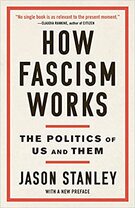 The focus of our July discussion was the book How Fascism Works: The Politics of Us and Them by Jason Stanley. We discussed how fascism operates to entice people into following leaders who often act against democracy and how we might respond against what seems to be a growing trend that undermines many countries in our time. The theme of this book is that fascism is based on creating scapegoats for the fears of those who believe themselves threatened. Leaders take advantage of people’s fear of losing their rights to “the other” whom they become convinced are out to steal them. These fears often are projected onto minorities portrayed as threats to the “real” national character. Following are selected quotes from the book.
Our group then discussed how to move past the inroads that fascism seems to be making in many countries. How do we create a world where we move toward its opposite — which is democracy — and work with others toward a more equal society? Part of the fascist mentality is characterizing people by the groups to which they belong rather than their individual actions. We can criticize fascist elements where we see them yet this often results in a circle of blame. But as individuals, we each can move toward a more democratic society by striving to see people more as they are beyond race, religion, gender, political preference and every other type of label we place on them. All of us at times engage in unfair judgments, and then sometimes look back and regret our actions as having been harmful when we may not have meant them to be. But if we learn from our very human pattern of judging others and begin to treat them with greater respect we can contribute to a more fair and equitable world. Perhaps we can begin to realize that the needs of others — for recognition of both their value as people and their physical needs — also are our needs. If our actions in our personal and political lives move us toward a world that maximizes the value and potential of everyone, those benefits also accrue to ourselves. This is the essence of democracy. Also, I recommend this article about the deterioration of democracy in Nicaragua as an example of what has happened to many countries in this century: https://www.nytimes.com/2021/07/04/opinion/daniel-ortega-nicaragua-election.html Your comments and thoughts always are welcome. Also, don’t forget to look at our blog site renewingdemocracy.org Please recommend this newsletter to people who you think might appreciate it. If you want to be added to the list to receive each new newsletter when posted, fill out our contact form and check the box just above the SUBMIT button. You may also use that form to be removed from our list.
Visit our Books page for information about purchasing The Future of Democracy, The Death of Democracy, Truth & Democracy, and Everyday Spirituality for Everyone. Click ↓ (#) Comments below to view comments/questions or add yours. Click Reply below an existing comment to respond.
0 Comments
Your comment will be posted after it is approved.
Leave a Reply. |
 5th edition now available 5th edition now available
Steve ZolnoSteve Zolno is the author of the book The Future of Democracy and several related titles. He graduated from Shimer College with a Bachelor’s Degree in Social Sciences and holds a Master’s in Educational Psychology from Sonoma State University. He is a Management and Educational Consultant in the San Francisco Bay Area and has been conducting seminars on democracy since 2006. Archives
July 2024
Categories |

 RSS Feed
RSS Feed